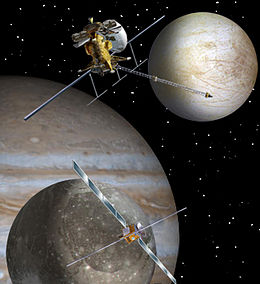EJSM

Artist concept of the Europa Jupiter System Mission: Jupiter Europa Orbiter (top) and Jupiter Ganymede Orbiter (bottom)
|
|
| Mission type | Multiple orbiters and lander |
|---|---|
| Operator | Proposed joint ESA / NASA |
The Europa Jupiter System Mission – Laplace (EJSM/Laplace) was a proposed joint NASA/ESA unmanned space mission slated to launch around 2020 for the in-depth exploration of Jupiter's moons with a focus on Europa, Ganymede and Jupiter's magnetosphere. The mission would have comprised at least two independent elements, NASA's Jupiter Europa Orbiter (JEO) and ESA's Jupiter Ganymede Orbiter (JGO), to perform coordinated studies of the Jovian system.
The Japan Aerospace Exploration Agency (JAXA) and the Russian Federal Space Agency (Roscosmos) had expressed their interest in contributing to EJSM/Laplace, although no deals had been finalized. JEO was estimated to cost $4.7 billion, while ESA would spend $1.0 billion (€710 million) on JGO.
In April 2011, ESA stated that it seemed unlikely that a joint US–European mission will happen in the early 2020s given NASA's budget, so ESA continued with its initiative, called the Jupiter Icy Moons Explorer (JUICE) that will be based on the JGO design. Selection of JUICE for the L1 launch slot of ESA's Cosmic Vision science programme was announced on 2 May 2012.
Later, in June 2015, NASA approved the Europa Multiple-Flyby Mission (Europa Clipper) and it entered the formulation stage.
In February 2008, NASA and ESA began joint investigations into sending a probe to study the icy satellites of the outer Solar System under the title Outer Planet Flagship Mission. Two primary candidate missions were considered under the study: EJSM and Titan Saturn System Mission (TSSM), also known under the ESA designation TandEM.
...
Wikipedia
